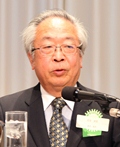��Magazine Month�� Meeting
A Diplomat��s Personal Observation on Canada and Quebec
April 4, 2012
Mr. Sadaaki Numata
Chairman, The English-Speaking Union of Japan
Former Ambassador to Canada
 Canada is the world��s second-largest country, 27 times the size of Japan. It��s a bilingual nation with both English and French as official languages. French is the official language in the Province of Quebec, rooted in the principle of gender equality, separation of state and religion as well as human rights consciousness.
Canada is the world��s second-largest country, 27 times the size of Japan. It��s a bilingual nation with both English and French as official languages. French is the official language in the Province of Quebec, rooted in the principle of gender equality, separation of state and religion as well as human rights consciousness.
Service industries, including finance, insurance and real-estate, construction and mining are the principle industries of Canada. Quebec today is the center of high-tech industries of aviation, pharmaceutics and IT.
��History of Canada and Quebec
Britain built the colony at Newfoundland at the end of the 16th century. France established a trading post in Quebec in early 17th century. The Seven Years�� War broke out between Britain and France in 1756, which resulted in the Treaty of Paris in 1763 and the cession of the French territory to Britain.
After the American War of Independence, the Loyalists settled in Canada and fights over Canada were raged against America. The British North America Act of 1867 created a federal dominion of Canada and the 1931 Statute of Westminster affirmed the independence of Canada.
The Roman Catholic Church dominated over Quebec from 17th to 19th century. The so-called ��Grand Darkness�� regime of Prime Minister Maurice Duplessis inflicted heavy-handed politics with suppressed freedom to Quebec from 1936 to 1959. After the 1960s, Prime Minister Jean Lesage led the ��Quiet Revolution,�� a socio-cultural change away from the conservative politics toward a liberal state. This Revolution also emboldened certain nationalists to push for political independence. In 1977, the Charter of the French Language was introduced, making French the only official language in Quebec.
��Reputation of Canada
The US Reputation Institute announced its research results last year on perceptions of 50 countries around the world measured by G8 countries. Research questions are classified into three areas: effective government, advanced economy, and appealing environment. Canada gained the highest reputation ranking, while Japan ranked 12th and the US 23rd.
��Canadian Identity
Canadians have mixed feelings towards the US, as Canada share borders with the US whose national power is 10 times larger than Canada. 80% of Canadians live within 100 miles from the border and Canadian trade is heavily dependent on the US. Prime Minister Pierre Trudeau from Quebec once stated that ��Living next to you is in some ways like sleeping with an elephant�� one is affected by every twitch and grunt.��
Canadians, on the other hand, tend to take pride in Canada being a more equal and fair society. Anglophone Canadian is said to resent being taken for an American.
Quebecers have a stronger sense of identity as a successor of the French language and culture. Quebec is like a ��solitary francophone island�� floating in the ��sea of English.��
Canada is a multiethnic society, often described as a ��salad bowl�� or ��mosaic society�� where people of different ethnicities and cultures co-exist based on mutual respect and tolerance.
Multiculturalism was adopted as the official policy of Canada since 1971. Canada has been accepting 200,000 immigrants each year, based on the creed to build a nation where everyone has an equal opportunity to participate. Quebec alone accepts 45,000 immigrants from over 100 countries each year. As a result, the so-called ��visible minority�� population is on the rise, reaching 5 million or accounting for 16% of the total population in 2006. The recent two female Governor Generals of Canada were immigrants from China and Haiti.
��Federal government and Quebec
There exist two confronting axes in the federal government: one is the axis between the Anglophone and Francophone groups and the other axis is between the eastern provinces of Ontario and Quebec (mainly represented by the Liberal Party) and the western provinces of British Columbia and Alberta (represented by the Conservative Party).
In Quebec, the Separatists are asking for independence from the federation and are confronting the Federalists. The 1980 referendum and 1995 referendum on sovereignty were both rejected, the latter by a slight majority. Today, Prime Minister Harper of the Conservative Party regained majority since 2006, while Bloc Quebecois lost many seats and the official party status in the 2011 federal election.
My personal feeling is that there is a��growing sentiment among the Quebecers that it is not realistic to choose the path of independence from the federation.
��Quebec��s diplomatic initiatives
Quebec currently has 26 delegations, offices and local agents around the world. Quebec has forged strong ties with France, and both Prime Ministers have been continuing mutual visits since 1977.
The Quebec-US relationship is equally important, as 78% of exports go to the US and 31% of the imports come from the US.
Quebec has deepened relationships with China since 1984.
Quebec opened its office in Japan in 1973, the largest in Asia. Japan is also an important trade partner.
��Economic Relationships between Japan, Canada and Quebec
Japan exports transportation equipments, automobiles and machineries to Canada, as well as automobiles and aircraft parts to Quebec.
Japan imports coal, soybean, pork, lumbers, non-ferrous metal, iron-ore and wheat from Canada, as well as high-tech measuring devices, medical equipments and optical instruments from Quebec.
The Canadian and Japanese governments announced on March 25th they were launching bilateral EPA negotiations to further stimulate trade and investment between the two countries.
��Charms of Quebec
My personal views on the four charming traits of Quebec are: cosmopolitan atmosphere in Montreal, European-taste castles in Quebec City, whale-watching on the Saint Lawrence River, and cultural sensibility of the Quebecers (including ikebana, bonsai and cooking).